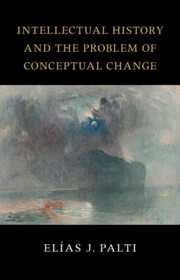
-
Select format
-
- Publisher:
- Cambridge University Press
- Publication date:
- May 2024
- May 2024
- ISBN:
- 9781009461245
- 9781009461191
- 9781009461214
- Dimensions:
- (216 x 140 mm)
- Weight & Pages:
- 0.5kg, 296 Pages
- Dimensions:
- (216 x 140 mm)
- Weight & Pages:
- 0.38kg, 296 Pages
You may already have access via personal or institutional login
Book description
How does long-term intellectual change occur? Can we develop a theoretical framework for understanding past systems of knowledge? In this ambitious study, Elías José Palti seeks to reassess the main concepts in the field of intellectual history. Evaluating modes of thought from the seventeenth century to the present, this book aims to prevent an anachronistic understanding of the texts of the past. Palti rejects the idea of conceptual change as a coherent process deriving from one single source. Instead, he offers a convincing explanation of converging developments emanating from three different sources: namely, the Cambridge school, the German school of conceptual history, or Begriffsgeschichte, and French politico-conceptual history. Intellectual History and the Problem of Conceptual Change also closely examines the temporality of concepts, questioning how and why political languages mutate.
Contents
Metrics
Altmetric attention score
Full text views
Full text views help Loading metrics...
Loading metrics...
* Views captured on Cambridge Core between #date#. This data will be updated every 24 hours.
Usage data cannot currently be displayed.
Accessibility standard: Unknown
Why this information is here
This section outlines the accessibility features of this content - including support for screen readers, full keyboard navigation and high-contrast display options. This may not be relevant for you.
Accessibility Information
Accessibility compliance for the PDF of this book is currently unknown and may be updated in the future.


